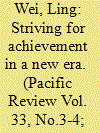|
|
|
Sort Order |
|
|
|
Items / Page
|
|
|
|
|
|
|
| Srl | Item |
| 1 |
ID:
176246


|
|
|
|
|
| Summary/Abstract |
This article adopts a constructive approach to examining the problem of the Indo-Pacific construct. Through reflection on the east Asian experience, it proposes an analytical framework of developmental peace as a constellation of international practices, which means that the more economic development is prioritized by states in regional processes, the more likely it is that a sustainable peace will be achieved. States participating in regional integration comprise a community of practice. On the basis of a shared understanding that development is of overriding importance and underpins security and state legitimacy, the community takes economic development as the anchoring practice; this practice embodies and enacts constitutive rules and fundamental norms for a broader set of practices in regional processes, such as peaceful coexistence and non-interference. The more economic development is prioritized on domestic and regional agendas, the more likely it is that conflicts in the security realm will be relaxed or even resolved to protect security interests. The author draws some useful implications from the developmental peace in east Asia for the Indo-Pacific construct, among which the most important include building shared understandings on the prioritization of economic development, taking advantage of the Regional Comprehensive Economic Partnership (RCEP), Comprehensive and Progressive Agreement for Trans-Pacific Partnership (CPTPP) and the Asian Infrastructure Investment Bank, and using the code of conduct process as a vehicle and best practice to facilitate rule-making for the maritime order. Finally, the author briefly discusses the contributions of the study and limitations of the model.
|
|
|
|
|
|
|
|
|
|
|
|
|
|
|
|
| 2 |
ID:
172120


|
|
|
|
|
| Summary/Abstract |
Since the doctrine of ‘keeping a low profile (KLP), attaining some achievement (ASA)’ was developed, there has been much attention and study of the KLP, but little discussion of the ASA. However, it is exactly how the ASA has been observed that can well reflect Chinese perception of its global role. In the paper, the ASA is treated as a continuum or a fluid concept with changing values. There have been significant adjustments in the official expression of the ASA doctrine since the 2008 global financial crisis, from the original ‘attaining some achievement’ to ‘proactively attaining achievement’ around 2011, ‘striving for achievement’ in 2013, and ‘striving for achievement in a new era’ in 2017. Along with these changes, there have been roughly three rounds of debates on the ASA among Chinese scholars. While they generally agree on more proactive diplomacy in attaining achievement, scholars have debated on what achievements to attain and how to attain these achievements. While the ultimate goal is defined officially as Chinese rejuvenation, specific and interim goals of ‘striving for achievement’ in scholarly debates have targeted mainly China’s strategic capability, institutional power and normative power. Chinese scholars have also debated on the general principles, diplomatic style and tactics that China should follow by focusing on three relationships: the relationship between the KLP and the ASA, the Sino-US relationship, and the relationship between China and the international system. The author provides an analytical framework and thorough examination of the development of the ASA doctrine, and presents the scholarly debates along its development path, in the hope that this study may facilitate the understanding of the outside world on how China perceives its global role.
|
|
|
|
|
|
|
|
|
|
|
|
|
|
|
|
|
|
|
|
|